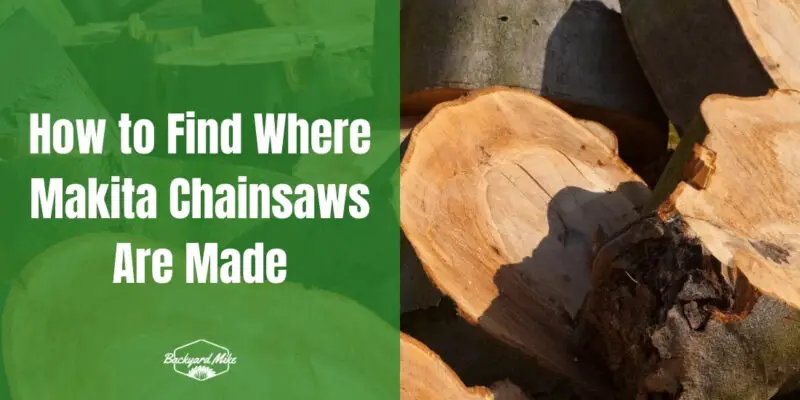To find out where Makita chainsaws are made, focus on their global manufacturing network. Makita produces chainsaws primarily in China and Germany. The German plant, known for its shift to battery-powered models, plays a major role in innovation. Additionally, understand that Makita's diverse production facilities cater to regional market demands, enhancing efficiency and quality. If you explore further, you'll gain deeper insight into Makita's production strategies and their commitment to eco-friendly solutions.
Key Takeaways
- Makita chainsaws are manufactured in their German plant, known as Dolmar, located in Hamburg.
- The Dolmar facility specializes in innovative and eco-friendly battery-powered chainsaw models.
- Makita's global manufacturing includes plants in Japan, China, Romania, Thailand, the U.K., Brazil, the U.S., and Germany.
- Approximately 90% of Makita's tools, including chainsaws, are produced outside of Japan.
- Local production aligns with regional demand, ensuring compliance with local safety standards.
Global Manufacturing Locations
When you're looking to understand where Makita chainsaws are made, it's essential to know the company's global manufacturing locations.
Makita's global operations span eight countries, enhancing manufacturing efficiency and ensuring high-quality tools. With plants in Japan, China, Romania, Thailand, the U.K., Brazil, the U.S., and Germany, Makita efficiently meets diverse market needs. Approximately 90% of tools are produced outside of Japan, highlighting the company's international manufacturing strength.
The integration of development, manufacturing, and sales across these locations guarantees consistent product quality. Each facility specializes in producing tools that match regional demand, achieving streamlined production processes.
For instance, the Okazaki plant in Japan focuses on technology advancements, while China's Jiangsu plant handles high-volume production.
The Role of the German Plant
Makita Engineering Germany GmbH, known as Dolmar, plays a pivotal role in Makita's production landscape. Located in Hamburg, this plant embodies German craftsmanship and Dolmar innovation.
Founded by Emil Lerp in 1927, Dolmar has long been recognized for its pioneering work in portable gasoline chainsaws. Acquired by Makita in 1991, it continues to influence the industry with its advanced designs and commitment to quality. Recently, Dolmar's change from gasoline to battery-powered tools highlights its dedication to sustainability. This shift is exemplified by achieving a production milestone of 10 million units on August 20, 2024, including the acclaimed DUC353 cordless chainsaw.
Founded in 1927, Dolmar's legacy in portable chainsaw innovation thrives under Makita's acquisition, driving quality and advanced design.
As a member of the Makita family, Dolmar guarantees high standards and reliability in all its outdoor power equipment.
Transition to Battery-Powered Chainsaws
As consumers and professionals seek more environmentally friendly tools, the change to battery-powered chainsaws becomes increasingly relevant. You'll find these tools offer zero emissions and lower noise, enhancing user comfort and reducing environmental impact. Thanks to advancements in battery efficiency, models like Makita's brushless motor chainsaws deliver performance comparable to gas-powered options. The Makita-built outer rotor brushless motor with a direct drive system ensures efficient performance and reliability. However, user adoption faces challenges, such as concerns about power for heavy-duty tasks and limited run-time. Despite these hurdles, the industry's focus on eco-friendly solutions and legislative support is driving the change. Manufacturers are responding with improved technology, including features like automatic chain lubrication and safety enhancements. Embracing these innovations can markedly benefit you, offering reduced maintenance and greater ease of use. The Makita LXT Battery Chainsaw stands out as a top model in 2025, featuring a 16-inch bar size and a power rating of 36V, with a weight of 17.96 pounds.
Regional Production Strategies
Although Makita chainsaws are made in several countries, understanding their regional production strategies can help you appreciate their global reach and efficiency.
Makita strategically uses a network of manufacturing facilities, including those in Germany, the US, Brazil, China, and Romania, to boost production efficiency and adapt to local market needs. This strategy allows Makita to tailor products for specific regional preferences, ensuring compliance with local safety standards. By sourcing components locally and forming strategic partnerships, Makita reduces reliance on imports, enhancing production efficiency. Their commitment to local market adaptation means chainsaws are designed to suit different climates and usage patterns worldwide. Makita's powerful engines are a testament to their focus on high performance and user-friendly designs, making them a preferred choice for both professional and residential users.
This approach not only improves supply chain management but also fosters a sense of belonging among global consumers.
Understanding Makita's Distribution Network
To understand Makita's distribution network, consider how the company strategically positions its facilities across the United States. Makita U.S.A., Inc.'s main office in La Mirada, California, oversees a robust network of distribution facilities. These are located in Flowery Branch, Georgia; Reno, Nevada; and Wilmer, Texas. They're expanding with a new 600,000-square-foot center near Atlanta, markedly boosting their operational structure. As a company that has been operating in over 40 countries with a global presence, Makita's strategic facility locations ensure efficient distribution and customer support across the U.S. Each facility not only manages logistics but integrates sales, training, and service resources. The Flowery Branch facility, in particular, will enhance service capabilities with its Southeast distribution center role.
Frequently Asked Questions
Are Makita Chainsaws Still Made in Japan?
You might wonder if Makita chainsaws are still made in Japan. While specific details are unclear, Japanese manufacturing strongly influences chainsaw quality, ensuring reliability and innovation. Trust in the craftsmanship that connects you to Makita's heritage.
What Materials Are Used in Makita Chainsaw Production?
You're curious about the materials used in Makita chainsaws, right? They source lithium-ion batteries, brushless motors, and durable metal components, integrating them into efficient production processes. You'll feel connected knowing every piece is crafted with precision.
How Does Makita Ensure Environmental Sustainability in Manufacturing?
You'll see Makita guarantees environmental sustainability by implementing sustainable practices and using eco-friendly materials. They focus on decarbonization, waste management, and innovation, making you part of a community that values a greener future.
Are There Any Makita Chainsaw Production Sites in Africa?
You'd search high and low, but finding Makita factories solely for chainsaws in Africa is like finding a needle in a haystack. African manufacturing currently relies on imports, fostering a sense of global connection and community.
How Does Makita Innovate Its Chainsaw Designs?
You're part of a community that values innovation. Makita constantly improves chainsaw designs by integrating cutting-edge technology and ergonomic design, ensuring comfort and efficiency, so you can confidently tackle any task with ease and precision.
Conclusion
To find where Makita chainsaws are made, consider their global manufacturing locations, including the key German plant. Curiously, these sites play a role in the shift to battery-powered chainsaws, reflecting Makita's innovative approach. By understanding regional production strategies and the distribution network, you'll gain insights into their global operations. It's not just about knowing where; it's about appreciating how these elements coincide to shape Makita's presence in the chainsaw market.


